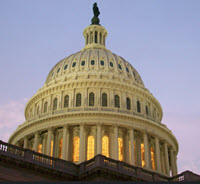Lawmakers return to Washington next week for a Lame Duck session after midterm elections that secured Democratic control of the House in January. Policymakers will immediately face a Dec. 7 deadline to fund parts of the government that may collide with President Trump’s goal to fund a border wall on the Mexican border – a possible impasse that could threaten a partial government shutdown.
 |
Lawmakers return to Washington next week for a Lame Duck session after midterm elections that secured Democratic control of the House in January. |
 |
Roundtable President and CEO Jeffrey DeBoer said, "We believe we will continue to be successful in Washington – regardless of which party controls the power levers – by maintaining our focus on smart research; strong political relationships; and our long-standing positive bipartisan approach to advocacy that emphasizes commercial real estate's contributions to job creation, communities, retirement savings and overall economic strength." |
The new dynamic of a divided Congress will refocus the commercial real estate industry on its policy agenda. Roundtable President and CEO Jeffrey DeBoer said, "The Real Estate Roundtable will maintain its steady course. We believe we will continue to be successful in Washington – regardless of which party controls the power levers – by maintaining our focus on smart research; strong political relationships; and our long-standing positive bipartisan approach to advocacy that emphasizes commercial real estate's contributions to job creation, communities, retirement savings and overall economic strength."
The Roundtable will hold its State of the Industry Meeting on January 29, 2019 in Washington, DC.
The Supreme Court's recent South Dakota v. Wayfair decision allowing States to collect tax owed on remote internet sales purchases could generate an estimated $250 million in annual revenue for the state of Virginia, which is aiming to start its online sales tax program this summer.
 |
The Real Estate Roundtable and seven other national trade organizations wrote to congressional leaders on Sept. 17, 2018 opposing any legislation that reverses or limits the Supreme Court's June 22 decision in South Dakota v. Wayfair, which allows States to collect tax owed on remote internet sales purchases. |
The business coalition letter explains that for more than a decade, industry groups "have undertaken significant efforts to establish economic parity between online and brick-and-mortar sellers that would better reflect the changing dynamics of today's omnichannel marketplace. For Congress to insert themselves post-ruling only creates additional uncertainty and further complicates the implementation process, while undermining the level playing field created by the Wayfair decision." (Roundtable Weekly, Sept. 21)
The eight organizations conclude the letter by offering to work with Congress on any problems that may arise from state implementation of remote internet sales tax collection allowed by Wayfair. (Roundtable Weekly, June 22)